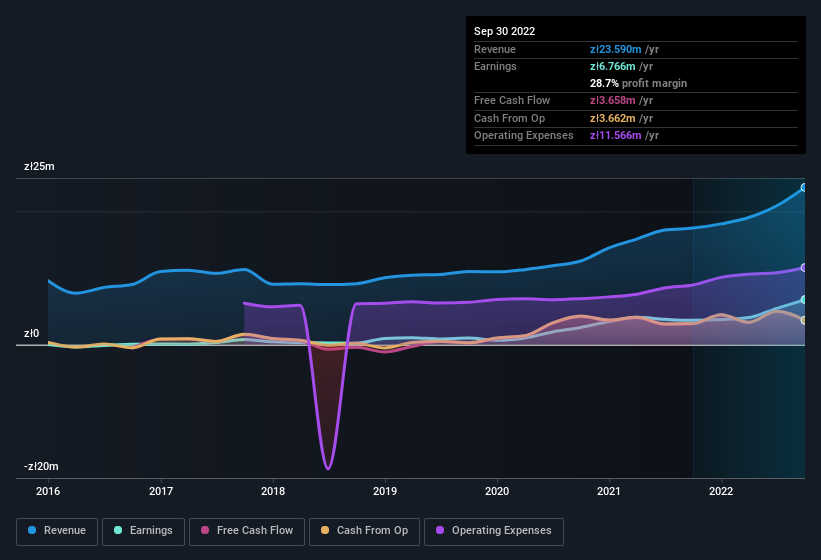Investors Shouldn't Be Too Comfortable With Netwise's (WSE:NTW) Robust Earnings
Netwise S.A.'s (WSE:NTW) stock was strong after they recently reported robust earnings. We did some analysis and think that investors are missing some details hidden beneath the profit numbers.
Check out the opportunities and risks within the PL IT industry.

Examining Cashflow Against Netwise's Earnings
One key financial ratio used to measure how well a company converts its profit to free cash flow (FCF) is the accrual ratio. The accrual ratio subtracts the FCF from the profit for a given period, and divides the result by the average operating assets of the company over that time. You could think of the accrual ratio from cashflow as the 'non-FCF profit ratio'.
As a result, a negative accrual ratio is a positive for the company, and a positive accrual ratio is a negative. That is not intended to imply we should worry about a positive accrual ratio, but it's worth noting where the accrual ratio is rather high. To quote a 2014 paper by Lewellen and Resutek, "firms with higher accruals tend to be less profitable in the future".
Over the twelve months to September 2022, Netwise recorded an accrual ratio of 0.70. Ergo, its free cash flow is significantly weaker than its profit. As a general rule, that bodes poorly for future profitability. In fact, it had free cash flow of zł3.7m in the last year, which was a lot less than its statutory profit of zł6.77m. We note, however, that Netwise grew its free cash flow over the last year.
Note: we always recommend investors check balance sheet strength. Click here to be taken to our balance sheet analysis of Netwise.
Our Take On Netwise's Profit Performance
As we have made quite clear, we're a bit worried that Netwise didn't back up the last year's profit with free cashflow. For this reason, we think that Netwise's statutory profits may be a bad guide to its underlying earnings power, and might give investors an overly positive impression of the company. But the good news is that its EPS growth over the last three years has been very impressive. At the end of the day, it's essential to consider more than just the factors above, if you want to understand the company properly. If you'd like to know more about Netwise as a business, it's important to be aware of any risks it's facing. For example - Netwise has 2 warning signs we think you should be aware of.
Today we've zoomed in on a single data point to better understand the nature of Netwise's profit. But there is always more to discover if you are capable of focussing your mind on minutiae. Some people consider a high return on equity to be a good sign of a quality business. While it might take a little research on your behalf, you may find this free collection of companies boasting high return on equity, or this list of stocks that insiders are buying to be useful.
Valuation is complex, but we're here to simplify it.
Discover if Netwise might be undervalued or overvalued with our detailed analysis, featuring fair value estimates, potential risks, dividends, insider trades, and its financial condition.
Access Free AnalysisHave feedback on this article? Concerned about the content? Get in touch with us directly. Alternatively, email editorial-team (at) simplywallst.com.
This article by Simply Wall St is general in nature. We provide commentary based on historical data and analyst forecasts only using an unbiased methodology and our articles are not intended to be financial advice. It does not constitute a recommendation to buy or sell any stock, and does not take account of your objectives, or your financial situation. We aim to bring you long-term focused analysis driven by fundamental data. Note that our analysis may not factor in the latest price-sensitive company announcements or qualitative material. Simply Wall St has no position in any stocks mentioned.
About WSE:NTW
Netwise
Netwise S.A. provides consulting and implementation services in CRM and cloud business applications areas in Europe.
Flawless balance sheet and slightly overvalued.
Market Insights
Community Narratives



